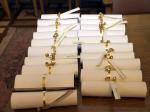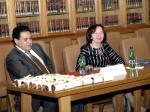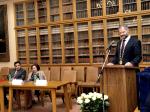The Recipient of the Premio Iberoamericano Award: Our Hope is to Reconcile with the World



16 February 2011
Out of 23 candidates, one of the main prizes of the 16th annual Premio Iberoamericano awards went to Eva Jandečková, a student of Spanish and French at the Charles University Faculty of Arts, for her thesis entitled “Ernesto Sábato: The Tunnel. The first and the other.“ It soon became evident that the meaning of the words “tunnel” and “the first and the other” are much more complex than they might seem. 23 theses submitted for this year’s instalment were written in Spanish or Portuguese. They were judged based on their content, linguistic qualities and originality.
1st place: Jan Darebný (Masaryk University in Brno) for his thesis “Compose Your Verse with Deliberation. Metre in Lope de Vega’s The Knight of Olmedo”
2nd place: Michal Kováč (Masaryk University in Brno) for his thesis “Marcelism in the Estado Novo – the Government of Marcelo Catano”
3rd place: Eva Jandečková (Charles University) for her thesis “Ernesto Sábato. The Tunnel. The First and the Other”.
|
What exactly does your thesis on the work of Ernesto Sábato focus on? My thesis focuses mainly on Sábato’s major novel El Túnel, first in a trilogy of the novels „El túnel,“ „Sobre héroes y tumba“ and „Abaddón el Exterminador“, or The Tunnel, The Heroes and Tombs, and The Angel of Darkness in English. The thesis identifies some of the themes that also recur in the second instalment, mainly the opposites and contrasts, because Sábato approaches not only literature, but also the world as such in terms of oppositions. Everything takes place in oppositions that he represents by a struggle or a harmony of two opposing forces. My thesis investigates some of the main dualities. Of course, there are many more of them to be found. |
|
|
|
|
Why did you choose your topic? Was it because of the quality of the literary work itself, or because of the broader implications of Sábato’s approach and the worldview you mentioned?
It was more of a lucky coincidence. I am grateful mostly to Dr. Hedvika Vydrová, my advisor, who introduced me to this topic and this writer. As for the focus of the thesis, it was her idea at first, but I soon became interested and quickly adopted it as my own, because it is a very complex and immersive novel, at least for me.
How will your relationship with the work of Sábato continue? Are you going to do some more research on it, or are you thinking about leaving it for other topics?
In my Master’s thesis, I’m going for a linguistic topic, so I’ve already left, but this is not the end of days. As for this author, I find him immensely interesting and his novels very moving, but rather depressing at the same time, so I believe I will come back to him eventually, but for now, I will enjoy some time apart.
Even the most depressing works of art hold some kind of hope. Did you find it in Sábato’s novel?
Scholars keep arguing whether The Tunnel contains some hope, or not. In my opinion, it is up to everybody’s personal interpretation. I personally think that there is hope in it.
And where does the hope come from?
I think it can be found in the narratives of the main characters. They start out as completely negative, but even if it ends quite badly for them, they find some peace and reconcile with the world, which has been opposed to them and to which they have been opposed.
(Marie Kohoutová)
Translation: Jaroslav Švelch
